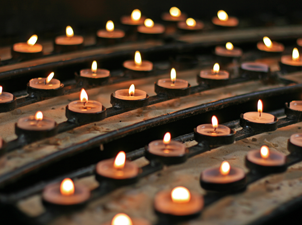
Prioritizing Communities Recovering from Disasters
Kaitlin Brown
October 24, 2017
In the past few months, natural disasters have ripped away the homes of many of our sisters and brothers in Florida, Texas, Puerto Rico, U.S. Virgin Islands, and California. Folks were left with limited time, just minutes in California, to pack up and flee to safety and are now returning to destroyed homes with few options. On conference calls with our housing partners working on the ground, I hear week after week about families in Puerto Rico going without electricity and clean water, and elderly folks in nursing homes in hurricane affected areas going without air conditioning. In Texas, people lined up overnight for D-SNAP (food stamps for those in disaster areas) only to be turned away for lack of identification. In Florida, low-income families and individuals were unable to afford the high cost of resort fees that came in addition to their FEMA hotel vouchers.
While these crises have unfolded, Congress moved quickly to pass the first of two supplemental disaster spending bills, and for this we are grateful. Right after Hurricane Harvey hit Texas in September, Congress passed a $15 billion aid package. This week, the House passed a $36.5 billion bill that is waiting to be voted on in the Senate. While this is a great start, it really is simply putting a Band-Aid on a much bigger problem. Experts expect more money will be needed down the road: Puerto Rico hasn’t been able to have damage assessments done to know how much money is needed, Texas alone has asked for $18 billion for recovery, and with wildfires still raging in California, the extent of the damage is not known.
So with this going on, and millions of people displaced, what has Congress decided to prioritize between now and the end of the year? Cutting taxes for the wealthiest corporations and individuals– a bill that would increase the deficit by $1.5 trillion– while also cutting crucial services for those most vulnerable. The budget plan voted on by Congress would be especially damaging for those affected by recent natural disasters, as it is focused on cutting crucial services for those most vulnerable, including SNAP and housing benefits, such as Section 8 vouchers. The tax bill that will quickly follow the budget, will add to our deficit by cutting taxes for the richest among us and corporations, while failing to supply any additional money to disaster relief and recovery.
As a person of faith, I think this is wrong. The need to care for the most vulnerable among us must take priority, and especially should not be neglected at the expense of tax cuts for the wealthiest. And while Congress has been bickering over the tax “reform” plan, many people in Puerto Rico are still without power and clean water, people in Texas and Florida are without stable, long-term shelter, and people in California are without entire cities. Our elected officials must do better to truly care for the most vulnerable among us.







